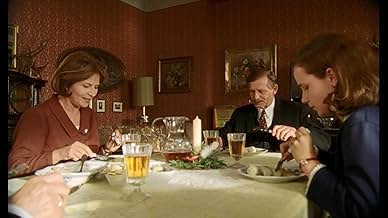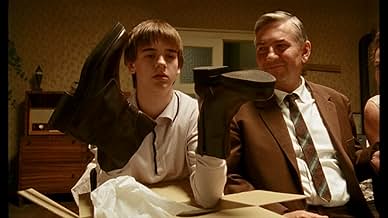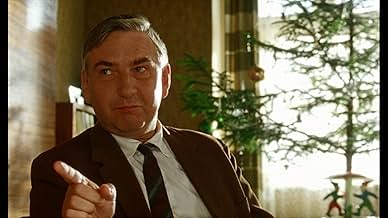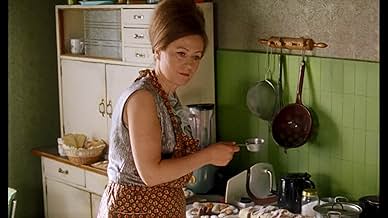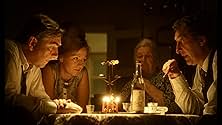Pelísky
- 1999
- 1h 55min
VALUTAZIONE IMDb
8,1/10
6677
LA TUA VALUTAZIONE
Aggiungi una trama nella tua linguaTwo families, Sebkovi and Krausovi, are celebrating Christmas, but not everyone is in a good mood. Teenage kids think their fathers are totally stupid; fathers are sure their children are no... Leggi tuttoTwo families, Sebkovi and Krausovi, are celebrating Christmas, but not everyone is in a good mood. Teenage kids think their fathers are totally stupid; fathers are sure their children are nothing more than rebels, hating anything they say.Two families, Sebkovi and Krausovi, are celebrating Christmas, but not everyone is in a good mood. Teenage kids think their fathers are totally stupid; fathers are sure their children are nothing more than rebels, hating anything they say.
- Regia
- Sceneggiatura
- Star
- Premi
- 8 vittorie e 8 candidature totali
Marek Javorský
- Péta
- (as Marek Morvai Javorský)
Recensioni in evidenza
10Fnord233
Prague in 1968 prior to the Soviet invasion. The setting is ideal for a political drama, but Czech artists prefer to make a comedy with political background. The action takes place in a house, where families from different political camps (pro-communist vs. anti-communist) live together. The story is told in such a warm, witty and funny way that it immediately resembles the golden years of Czech movie industry in the 70's and 80's. This movie was a tremendous hit on the local Czech market, unfortunately it has never reached my country (Poland). I've had a chance to see it only on the Warsaw Film Festival. It's sad but all the time distributors prefer to show s****y Hollywood cheesy-style romances or action packs, instead real-value movies. Definitely one of the movies of 1999 IMHO. The same goes for other Czech movie - "Return of the Idiot" (Navrat Idiota) - watch out for Czechs, they are on the right track again.
A beautifully understated story of ordinary people living their everyday lives through the trying times of Christmas '67 and the Prague Spring during the run up to the Soviet invasion. While the setting has be caught with stark and depressing realism, the film is perfectly balanced with a gently comic and bittersweet observation of the families and their relationships as they struggle through events from the mundane to the tragic. Personal loss, both of freedom and of loved ones, and the way life still manages to go on has been captured with deceptive ease and without resorting to the usual cliches and predictable attempts at closure that so often seem to pollute western cinema of this type.
i saw pelisky in 2000 at the international film festival in aukland, new zealand. almost 5 years later, having only seen the film that one time, i cannot forget how much i loved it. wonderfully funny and tragic, extremely well-acted, by far the best foreign language film in the festival. it was the the highest grossing czech film of the year at the czech box office, third only to titanic and kolya. unfortunately, i'm not sure if it made it into any American theatres and i have not been able to locate a copy since i returned home. if at all possible you get your hands on a copy of pelisky, i promise you will adore this film.
Cosy Dens (1999) is the ironic name given to the film that was called Pelísky in Czech. The movie was directed by Jan Hrebejk.
Two families are celebrating Christmas in the same apartment house during the Prague Spring. The father of one family is patriotic and anti-Russian. The father of the other is an army officer, and pro-Russian. The basic plot revolves around the relationships between these families. Clearly, the families symbolize two aspects of Czech society in 1968--some refused to accept the Soviet occupation, and denounced it when they could. Others turned the occupation to their advantage.
The movie has several plot threads. The two fathers argue constantly. The young son of one family loves the daughter of the other. (It's not Romeo and Juliet--his love is unrequited.) An aunt hopes to find a husband, but her son and her bad luck get in the way.
It's interesting that even the army officer's family celebrate with a traditional Christmas. It's very interesting--at least to a non-Czech--that the families keep a live carp in the bathtub, which is apparently a traditional aspect of the Czech Christmas.
The film is not just a comedy. It is a symbolic representation of the tensions of the Czech people, who must adapt to the fact that Russia controls their destiny. They don't know--but we know--that the Prague Spring will come to an end not through liberation, but through the roar of the Warsaw Pact tanks rolling through Prague.
There's a long shot of birds in a cage near the end. The presenter of the film made the symbolism clear. The birds have enough food and water to survive, but the central fact of their existence--like that of the Czechs--is that they are not free.
Seen as part of the outstanding Alan Lutkus International Film Series at SUNY Geneseo. The film is on DVD, and was projected onto the large screen. It will work on the small screen as well.
Two families are celebrating Christmas in the same apartment house during the Prague Spring. The father of one family is patriotic and anti-Russian. The father of the other is an army officer, and pro-Russian. The basic plot revolves around the relationships between these families. Clearly, the families symbolize two aspects of Czech society in 1968--some refused to accept the Soviet occupation, and denounced it when they could. Others turned the occupation to their advantage.
The movie has several plot threads. The two fathers argue constantly. The young son of one family loves the daughter of the other. (It's not Romeo and Juliet--his love is unrequited.) An aunt hopes to find a husband, but her son and her bad luck get in the way.
It's interesting that even the army officer's family celebrate with a traditional Christmas. It's very interesting--at least to a non-Czech--that the families keep a live carp in the bathtub, which is apparently a traditional aspect of the Czech Christmas.
The film is not just a comedy. It is a symbolic representation of the tensions of the Czech people, who must adapt to the fact that Russia controls their destiny. They don't know--but we know--that the Prague Spring will come to an end not through liberation, but through the roar of the Warsaw Pact tanks rolling through Prague.
There's a long shot of birds in a cage near the end. The presenter of the film made the symbolism clear. The birds have enough food and water to survive, but the central fact of their existence--like that of the Czechs--is that they are not free.
Seen as part of the outstanding Alan Lutkus International Film Series at SUNY Geneseo. The film is on DVD, and was projected onto the large screen. It will work on the small screen as well.
10jerzym
In last few days I've made my own home festival of Czech movies. Today in cue was Hrebejk's "Pelisky". Some times ago I've watched his Musime Si Pomahat so I expect great film. But today's movie touched me very deep, reminding some moments from my life. I was born in 1952 so in 1968 I was in same age as young characters of the movie. In august I was on my holidays in the little town in south Poland where my granny lived - just about 150 km from the border of Czechoslovakia. For the rest of my life I will remember the sound of the soviet warplanes heard 20/21 August. I've been watching this movie with the tears in my eyes. I knew all the songs from the CSR big-beat groups because in 1967/68 I've everyday listen the Stanice Hviezda from Ostrava - 80 km from my home town. Really, really great movie. Understandable not only for the Czech & Slovak people.
Lo sapevi?
- QuizMost of the jokes used in the movie are based on Czech writer Petr Sabach's book "Hovno hori" ("Shit burns"). The book consists of various unconnected stories.
- BlooperWhen Elien receives the package from America, it has three stamps affixed totaling only 8 cents. Notwithstanding that this is a paltry amount of postage to send a heavy package abroad, the three stamps had not been yet issued in America in December 1967. (The green Jefferson stamps were issued January 1968 and the larger Eisenhower stamp not until 1969)
- ConnessioniFeatured in Kovy: Vsehochut #1 (2016)
I più visti
Accedi per valutare e creare un elenco di titoli salvati per ottenere consigli personalizzati
- How long is Cosy Dens?Powered by Alexa
Dettagli
Botteghino
- Lordo in tutto il mondo
- 2.227.953 USD
- Tempo di esecuzione
- 1h 55min(115 min)
- Colore
- Mix di suoni
- Proporzioni
- 1.66 : 1
Contribuisci a questa pagina
Suggerisci una modifica o aggiungi i contenuti mancanti

